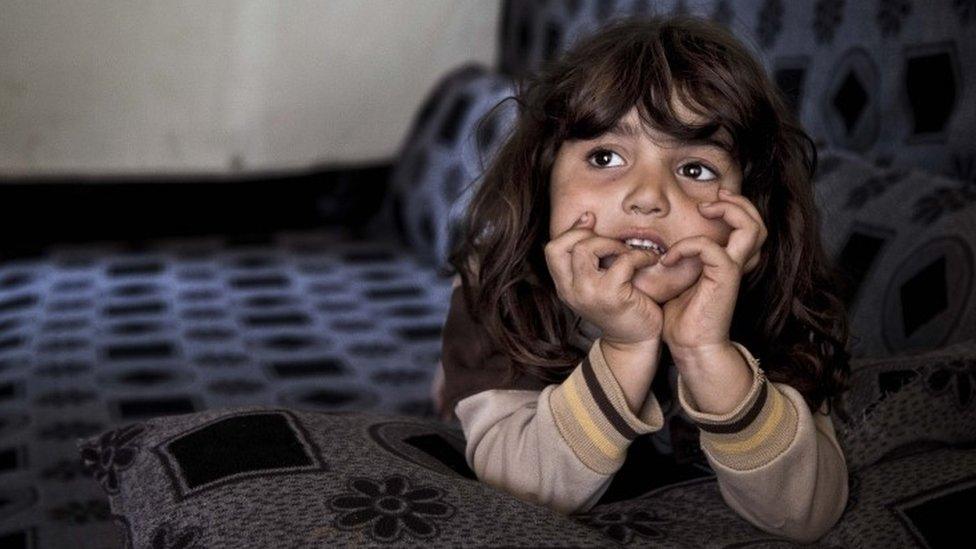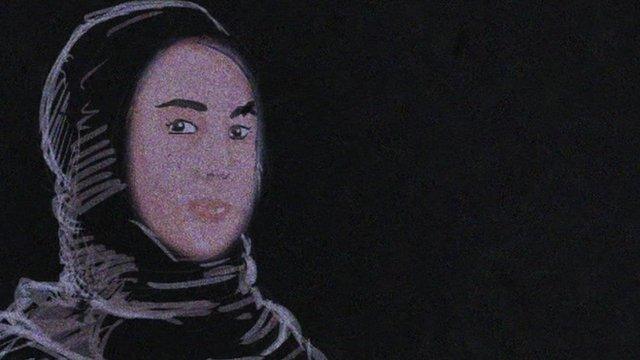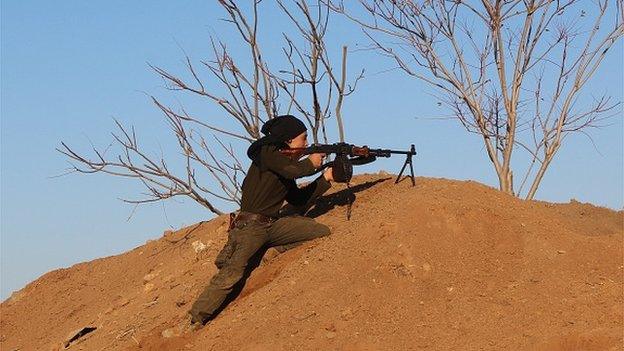BBC 100 Women: Syria's 'lost generation' of children
- Published

Syrian children have been unable to continue their education because of the war
At least two million Syrian children have dropped out of school because of the war which began almost five years ago, according to estimates by the UN children's fund, Unicef.
The violence engulfing the country may cause a further 400,000 children to drop out, says the international body.
Barrel bombs, airstrikes and general violence have pushed millions of Syrians out of the country, many finding refuge in Lebanon, Turkey or Western Europe.
And this is happening with increasing frequency.
An amateur cameraman filmed the aftermath of a barrel bomb that hit the suburb of Douma in Damascus. In the footage, he followed a man in his fifties who was looking at the destroyed building and screaming in shock.
"My daughter was here - she was studying here. My children were here," he says.
Then, on camera, another airstrike hit the same area. We did not hear or see the man anymore. He went to join his lost children.
In the same suburb, a few days earlier, another barrel bomb had hit a market, where many locals buy their food.
The camera shows us the aftermath. It takes us to a hospital where one girl in a red purple top is covered in white dust mixed with red lines dripping over her bleeding face.
She is nearly seven years old, but old enough to worry about her siblings.
"I am fine, I am fine, get me my brothers and sisters, they are still trapped under the rubble" she says.
These are ordinary scenes that keep coming out of Syria, where death is close to normality. And this is what the people trying to reach Europe are fleeing from.
They are putting their children at risk of drowning in the sea, as the water is safer than the land they are fleeing.
They have chosen Europe in the hope of finding a better future for their children, a chance to live in a world free of fears.
And most importantly - to get their children back in school. The two million Syrian children who have dropped out of school because of the war are a feared lost generation.

This is the story of Muzzon Al-Mellehan, a 17-year-old Syrian who fled war in 2013, who is one of the BBC's 100 Women 2015.
She and her family have lived for two years in a refugee camp in Jordan, where she is known as the Malala of Syria due to her campaign to keep girls like her in school, rather than being married off.
She and her family have lived for two years in refugee camps in Jordan.

A fraction
The number of Syrian refugees who are reaching Europe is only a fraction of the staggering number of those affected by the war there.
Imagine if all the people in London were to lose their homes. That is approximately the number of people in Syria who have been displaced and lost their homes due to the ongoing government bombardment.
Another four million are refugees, not in Europe, but in neighbouring countries.
Most of them are still living in tents and refugee camps in Jordan, Lebanon and Turkey.
Half of them are women and children. They are probably still there as they don't have thousands of dollars to pay a smuggler to get them to Europe.
The majority of Syrians are fleeing the government brutality while the West seems more focused on targeting the so-called Islamic State (IS), especially after the recent Paris attacks.
But activists say barrel bombs and airstrikes by both regime forces and their Russian allies continue to cause the highest number of casualties, insisting that the government strikes have killed more civilians than IS have.
It is nearly five years since government forces in Syria opened fire on peaceful protesters who took to the streets calling for change, freedom and democracy.
The scene in Syria today is far from what many had hoped for.
There is a great sense of frustration and disappointment among Syrians, whether they reached Europe or stayed behind.
For many the children and people of Syria deserve to live in peace and have access to education. And for them to stop reaching Europe and stay home, first the war must end.

Turkey is home to more than two million people who have fled the war in Syria.
Many refugees are working as volunteer teachers, hoping to help young people learn new skills. This is the story of Siba Aliradi, who is teaching Turkish to refugee Syrian children in Istanbul, and is also on the BBC 100 Women list.
Many Syrian refugees are in Istanbul, and other Turkish cities


Our 100 Women season showcases two weeks of inspirational stories about the BBC 100 Women and others who defy stereotypes around the world.
Like us on Facebook, external, follow us on Instagram, external using the hashtag #100Women, external and listen to our programmes here.

- Published25 November 2015

- Published30 November 2015

- Published1 December 2015
